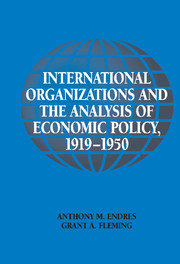Book contents
- Frontmatter
- Contents
- List of Figures and Tables
- List of Abbreviations
- Preface
- 1 Economics and Policy in International Organizations: Introduction
- 2 Business Cycles: Conceptions, Causes, and Implications
- 3 The Role and Conduct of Monetary Policy in the 1920s and 1930s
- 4 Public Investment Programs in the Interwar Period: Pre-Keynesian, Proto-Keynesian, and Keynesian Perspectives
- 5 Trade Policy Research: Geneva Doctrine and the Scandinavian Connection
- 6 Social Economics at the ILO: Scope, Content, and Significance
- 7 International Finance and Exchange Rate Policy
- 8 The Full Employment Movement from the 1940s
- 9 Conclusion
- References
- Index
8 - The Full Employment Movement from the 1940s
Published online by Cambridge University Press: 29 July 2009
- Frontmatter
- Contents
- List of Figures and Tables
- List of Abbreviations
- Preface
- 1 Economics and Policy in International Organizations: Introduction
- 2 Business Cycles: Conceptions, Causes, and Implications
- 3 The Role and Conduct of Monetary Policy in the 1920s and 1930s
- 4 Public Investment Programs in the Interwar Period: Pre-Keynesian, Proto-Keynesian, and Keynesian Perspectives
- 5 Trade Policy Research: Geneva Doctrine and the Scandinavian Connection
- 6 Social Economics at the ILO: Scope, Content, and Significance
- 7 International Finance and Exchange Rate Policy
- 8 The Full Employment Movement from the 1940s
- 9 Conclusion
- References
- Index
Summary
INTRODUCTION
Much research work in international organizations during the 1940s focused on policies associated with full employment. The experience of worldwide depression in the 1930s and the rise of Keynesian macroeconomics played a significant part in research on the problem of transition from wartime in both developing economies and developed economies. The late 1930s and early 1940s were described as a “great transformation … in economic thought” at the ILO where “the economy was no longer regarded as being fundamentally self-directing” and “the possibility of an equilibrium at a low level of employment for an indefinite period of time had been recognised” (ILO 1950a: 25). Research effort on the immediate policy problems associated with postwar transition drew upon earlier LON work on economic developments post-First World War. Major issues involved economic reconstruction, relaxation of price controls, and the containment of inflation, restoration of international trade, demobilization of labor, and the avoidance of mass unemployment. Employment policy continued to feature prominently in ILO and UN work throughout the decade due to recognition of the link between unemployment and social and political problems. The international community in the new postwar world order appeared to establish a consensus predicated on the belief that countries could exploit “the possibilities for concerted government action to attain global social objectives” (Lee 1994: 474).
While the economic problems facing countries postwar were familiar to researchers, the international policy institutions that were born after the Second World War placed a new set of responsibilities on international organizations.
- Type
- Chapter
- Information
- Publisher: Cambridge University PressPrint publication year: 2002



